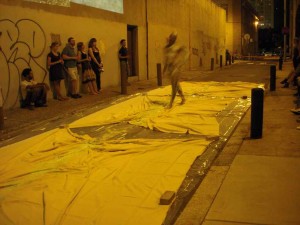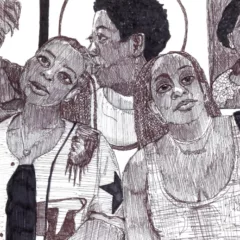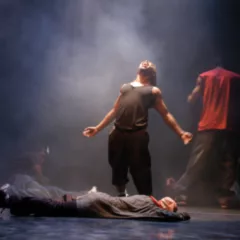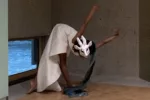The promise that Jacolby Satterwhite showed at his performance a week ago at Jolie Laide had more to do with costuming and video than performance itself.
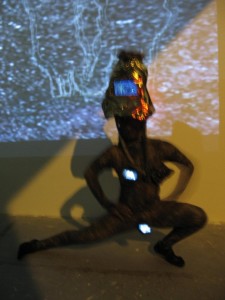
An eager crowd filled the project space of the gallery and the street outside for this one-night only Fringe performance by the young, 2010 Penn MFA. There were maybe 150 people in all, as hip hop music blared from speakers. We were told the performance would begin at 8. It was more like 8:30 by the time it began.
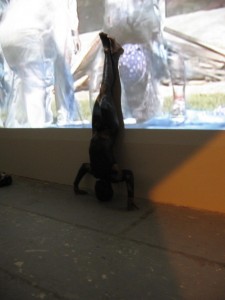
At last the artist emerged in a costume–dancing to the music in a leopard head-to-toe body suit that even encased his face. Best of all, the outfit was bejeweled with several tiny video monitors. The golden headdress with chain-mail dreads hanging from it had a monitor embedded, front and center. Other video monitors in the body suit served as beacons for sexuality. In the stunning, unmatched transgender female breasts, for example, there was one tiny monitor (the other breast was notable for its outrageous conical torpedo of fabric). Yet another monitor served as a figleaf for the genitals; it hid and advertised simultaneously. The whole costume was riveting in its merger of body and technology, male and female, and exhibitionism and hiding.
With the headdress, the artist achieved an alien look that truly was unique. As part of the performance — which entailed a stripping away of the trappings and exposing raw flesh — Satterwhite pulled the heavy headdress off and passed it to the audience, which then passed it through the crowd. There were other crowd/artist interactions, mostly benign, as the artist wandered around, getting into peoples’ space, but not really touching them or provoking them to touch him. This was not about touch or reaching out, but more about people not reaching out, yet having an obsessive need to communicate.
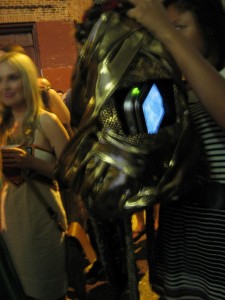
The performance–basically a few vogueing dance moves, long-lasting headstands and stripping off the body suit and then tearing off some painty adhesive coating (ouch)–felt undeveloped and repetitive. Satterwhite’s need to perform is palpable and there is a poignancy to the self-revelation and stoic resolve in acrobatic moves that clearly are uncomfortable and will leave him hurting the next day. Where was he going with the suggestions of pain and again of endurance, all staged, gladiator-like, in the public arena?
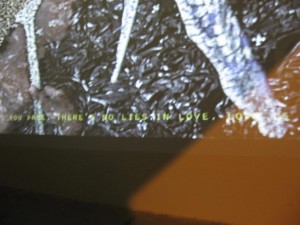
On the other hand, the voguing-inspired sci-fi/costume/dance videos, projected on the walls behind the artist intrigue, with their rituals of endurance and sexual suggestion, including one with a cast of haz-mat suited people slapping with paint-loaded rags a naked Satterwhite hanging upside down. These sci-fi videos were paired with movies from Satterwhite’s childhood–of kids dancing at family reunions. The innocence of these latter memories served to de-sexualize somewhat the more recent, charged material.
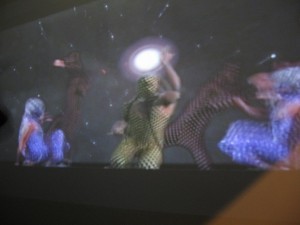
There’s something interesting here–especially in the comparison of the family videos and the sci-fi, 3D animated universe. It’s like The Jeffersons meet The Man Who Fell To Earth and they’re all mixed up in a video game platform with repetitive cycling of imagery locked in until someone pulls the trigger and takes it to the next level.
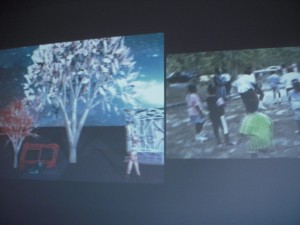
Like Chris Burden, who spared us the face-to-face interaction when he crucified himself on the hood of a VW bug, leaving us only the video documentation, Satterwhite’s video performances achieve a mythic state that this real world performance at least lacked. We look forward to following the artist as he moves forward with his personal, highly idiosyncratic and potentially important material.
